

Her husband started insisting that someone was spying on him.
Then he suspected that their neighbour was pouring urine on the electrical box outside their flat. So he got their elder son to stand outside their front door to keep watch.
“When I learnt about it, I went berserk,” said Margaret Ong, now 59. It was mid 2008, and her son was supposed to be studying for his Primary School Leaving Exam (PSLE).
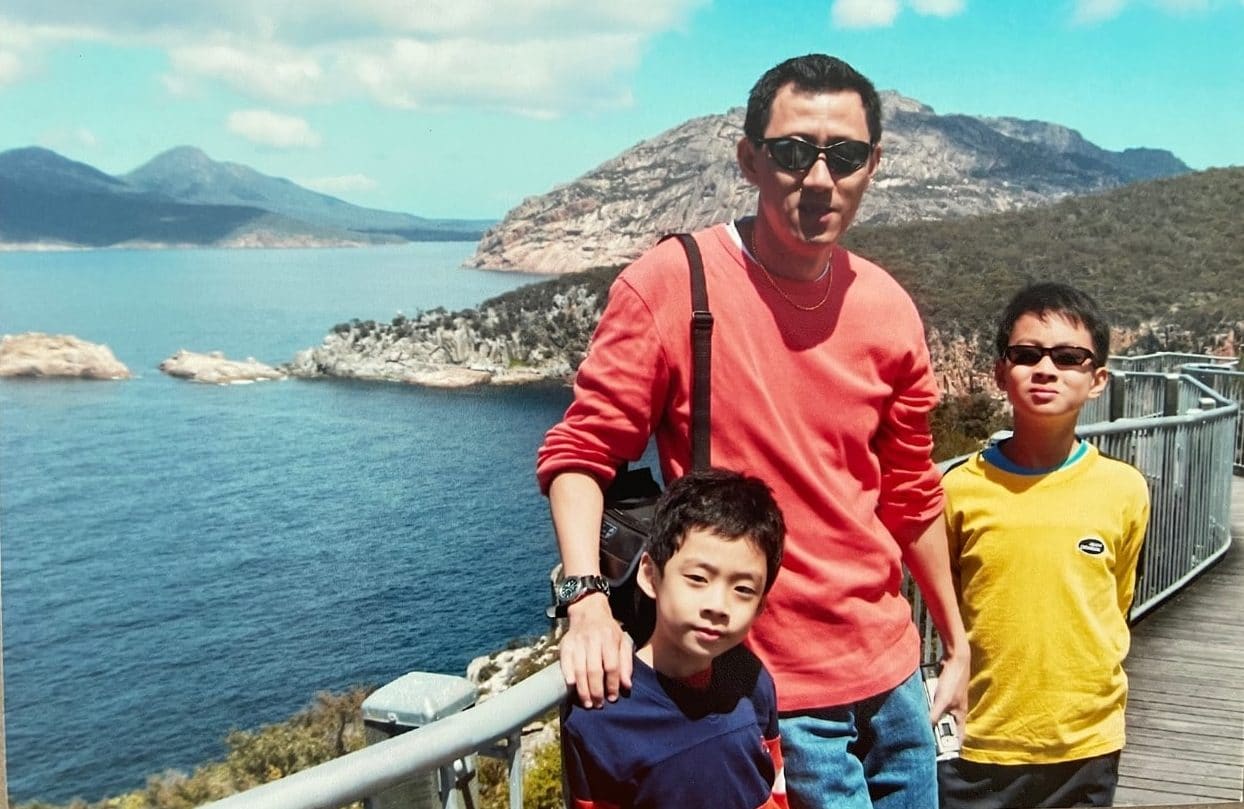
Margaret’s husband with their sons in 2005 in Tasmania. While he was a firm father, their children preferred him to her when they were very young, she said.
Margaret told her husband to install a camera outside their home. He took her suggestion much further.
“He got in a professional to install cameras at every vulnerable spot around the house where people could look in.”
“I think you need to take your husband to the doctor,” the PI told her.
Coming home from work one day, she found that her husband had covered all their windows with black paper. He also had put bedsheets over them.
“He switched off the lights in the house because he said people could look inside. Our son couldn’t even study for his PSLE.”
Not realising that this was the onset of mental illness, Margaret became “flabbergasted and frustrated” by the person her once thoughtful, loving husband had become.
Throughout their five-year courtship and in the first 16 years of marriage, there was no hint that her husband was suffering from mental illness or had problems dealing with stress.
Margaret’s husband was a gentle romantic, who told her he loved her all the time. Even coming up behind her, and whispering it in her ear when she was brushing her teeth.
However, taking his place was a distant and aloof man who ignored her as she sobbed herself to sleep.
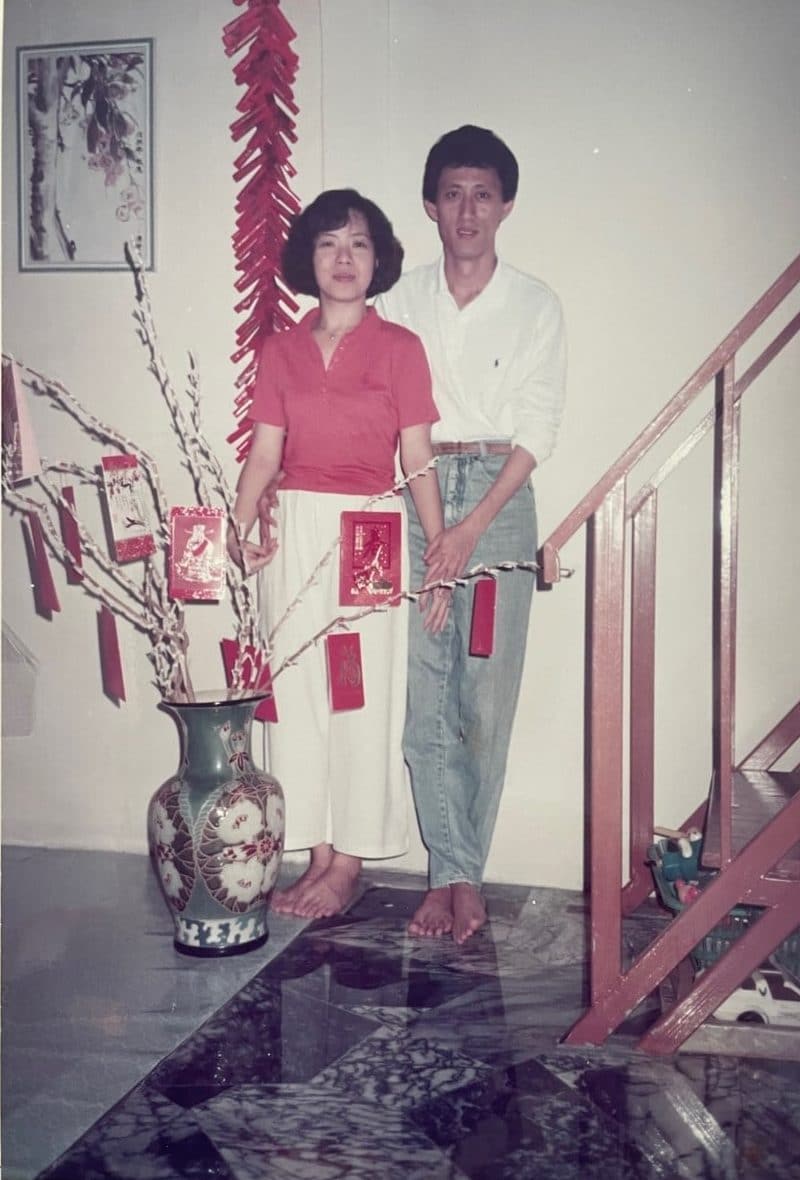
The couple in 1992 visiting Margaret’s family in Perak. Margaret was educated at a convent school in Malaysia.
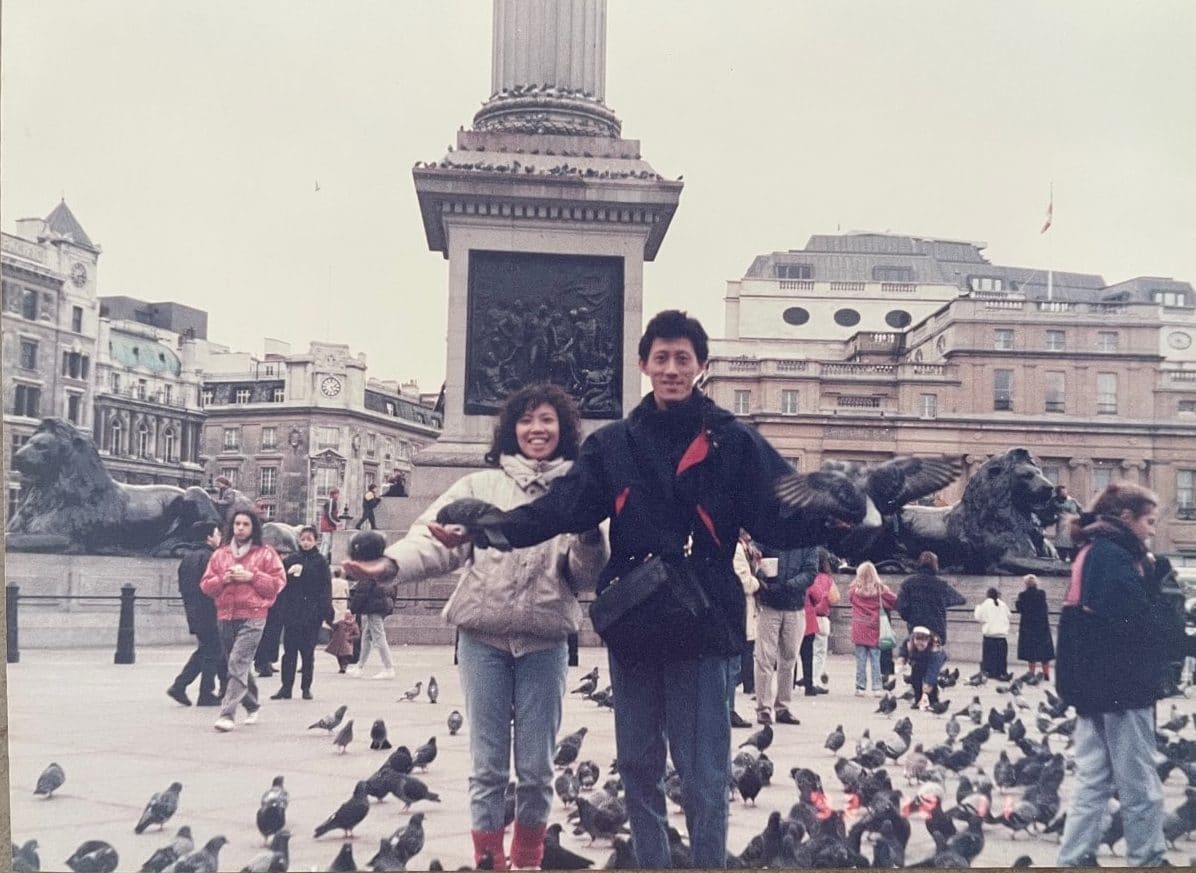
On their honeymoon in London in 1993. They had met at a business lunch when Margaret was 23 and a forex broker. He was a client, a forex trader in a foreign bank, and just a year older than her.
Desperate, Margaret found herself crying out to God, even though she had never been drawn to Christianity.
“I asked God, ‘Why me? Why does this have to happen?’
She challenged Him, “Show me You are a true God.”
Then one night, after crying for many months, something surprised her. It showed her that God had indeed heard her.
Her husband took a tissue, turned to her and asked, “Dear, what’s wrong?”
He brought Margaret to his shoulder and patted her.
Margaret felt, “Okay, God. Now You have answered me. You are present here with me.”
Eventually, things got so bad that Margaret hired a private investigator (PI) to see if her husband was truly being spied on as he had feared.
“For four days, the PI watched him and there was no evidence that someone was tailing him everywhere, calling his name,” she said.
“I think you need to take your husband to the doctor,” the PI told her.

On a trip to Malacca in 1994.
Margaret did. Her husband was diagnosed with schizophrenia – nine months after the onset of his odd behaviour. The paranoia was a symptom.
“It came as a surprise to everybody because he is the sort whom I felt would be able to handle stress well.
She suspected that it was triggered by him being retrenched for the second time.
“He took it very hard. He believed the man of the house should be the one to bring home the bacon.”
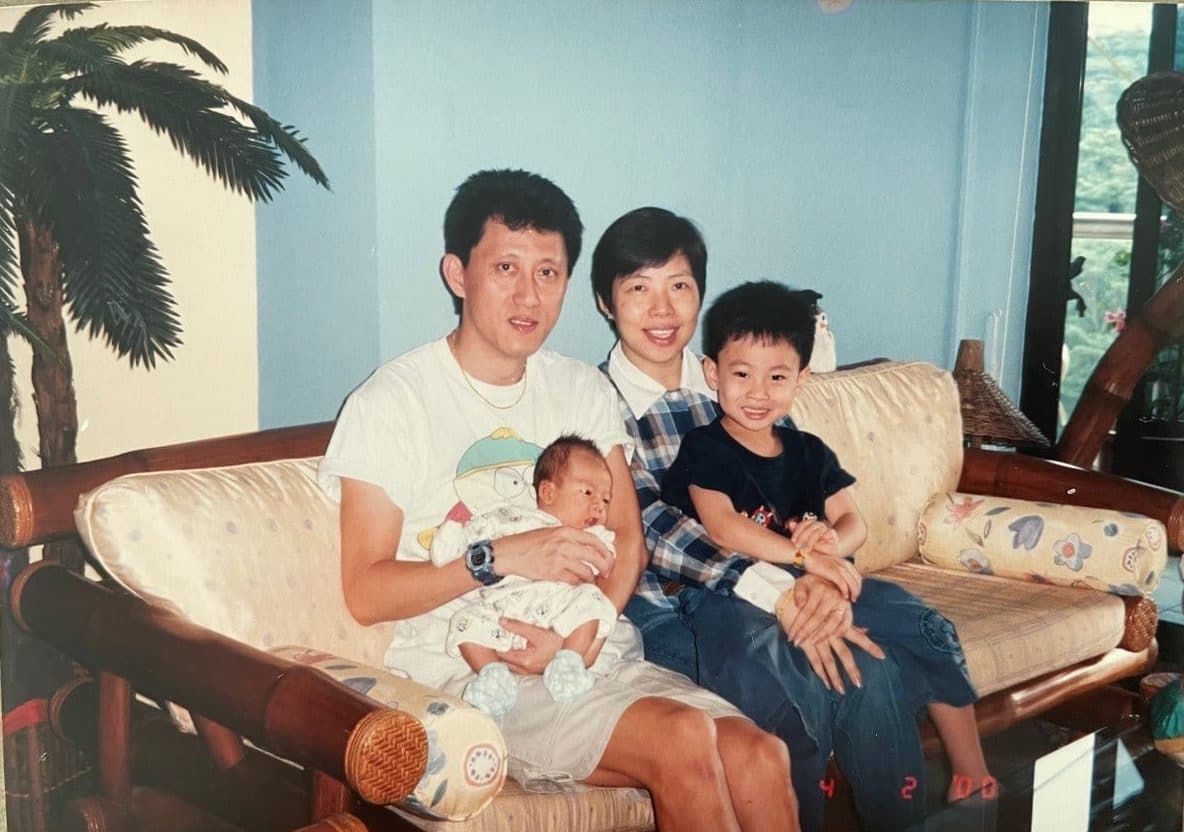
The family welcomed their second son in 2000. Their first was born in 1996.
She wrestled with guilt, blaming herself for “not acting earlier”.
“I also felt he was hindering my career,” said Margaret who was then aiming for an overseas posting.
Her husband refused to accept that he was ill and Margaret had to coax him to take his medication.
When the medicine worked, the intervals between relapses would lengthen over time. He would be focused enough to even go indoor skydiving at Sentosa with the family.
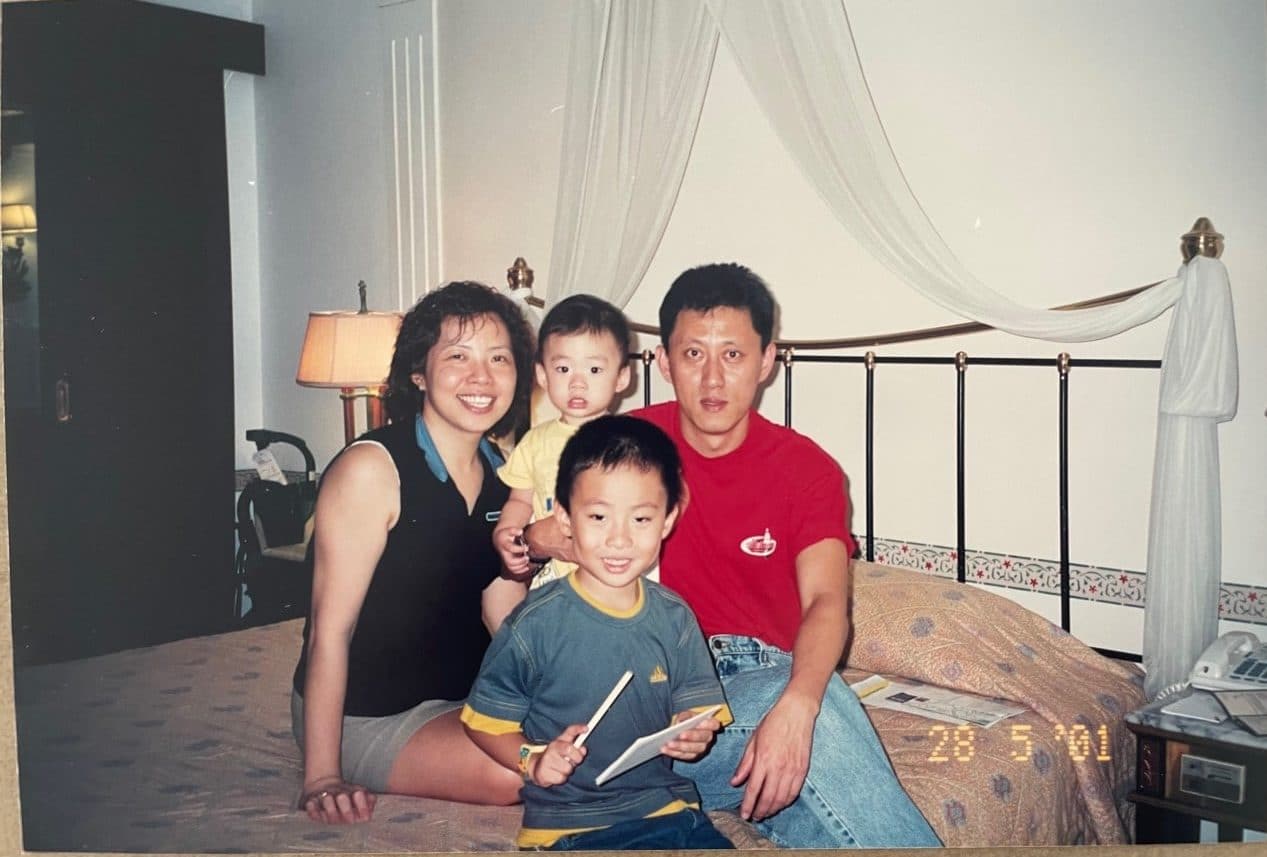
The family on a holiday in Phuket in 2001.
But when he was in a state of psychosis, he would hallucinate, hear voices, and become paranoid.
“He installed four latches on the door of our flat. He claimed that people would otherwise break into the house.
“It was very upsetting having to remove four latches to step out of the house.”
Thinking that he was still working, he bought luggage and went as far as taking a taxi to Changi Airport.
One night, believing that someone was sabotaging the air-conditioner in their room, he asked the family to move into a hotel.
When Margaret refused, he went alone, booking two rooms at a five-star hotel but staying only two hours in one before returning home.
Her husband also had delusions of grandeur. Thinking that he was still working, he tailored suits and bought luggage.
“He bought new pairs of shoes and told me he was flying off to the US for a meeting.”
He went as far as taking a taxi to Changi Airport
He believed he owned companies – a bank, a football club, an airline – that their children could take over.

Margaret and her husband in Krabi, Thailand, in 2019. Memories of such seasons of clarity and normalcy are what she clings to when her husband experiences relapses.
Her younger son was frightened by the changes he saw in his father.
Her elder son was concerned that he would inherit his father’s mental illness.
“He asked me, ‘Which person will allow their daughter to marry me?’”
Though neither was a Christian, Margaret put a Bible beside his bed and would pray with him when he was afraid. She would encourage her son to trust in God.
“We were all dealing with our own pain and struggles.
“We were a dysfunctional family in the first three years of his illness.”
At times, Margaret’s husband would drive off and forget how to get home. He would be uncontactable for hours.
Desperate and worried, she would kneel and pray.
“There were two occasions when my girlfriend’s name came to mind. I called her to pray for my husband.”
Their prayers were answered.
“When she looked up, she saw my husband walking by.”
She felt that “God was truly present in my life”.
One day, she told God, “Isn’t this enough? I don’t know how to handle all this.”
Her husband also racked up so many unpaid parking fines that Margaret, whom the car was registered to, was issued a summons to appear in court.
When her elder son became a teenager, she would ask him to look after his dad or pick up his medication instead of going out.
“My son resented the additional responsibility placed upon him and became rebellious.
“He would ask, ‘How come people my age don’t have to carry this burden?’”
Mother and child ended up having a major argument.
One day, she told God, “Isn’t this enough? I don’t know how to handle all this.”
That night, she found her son writing her a letter of apology. “I was so touched. Truly God is very gracious.”
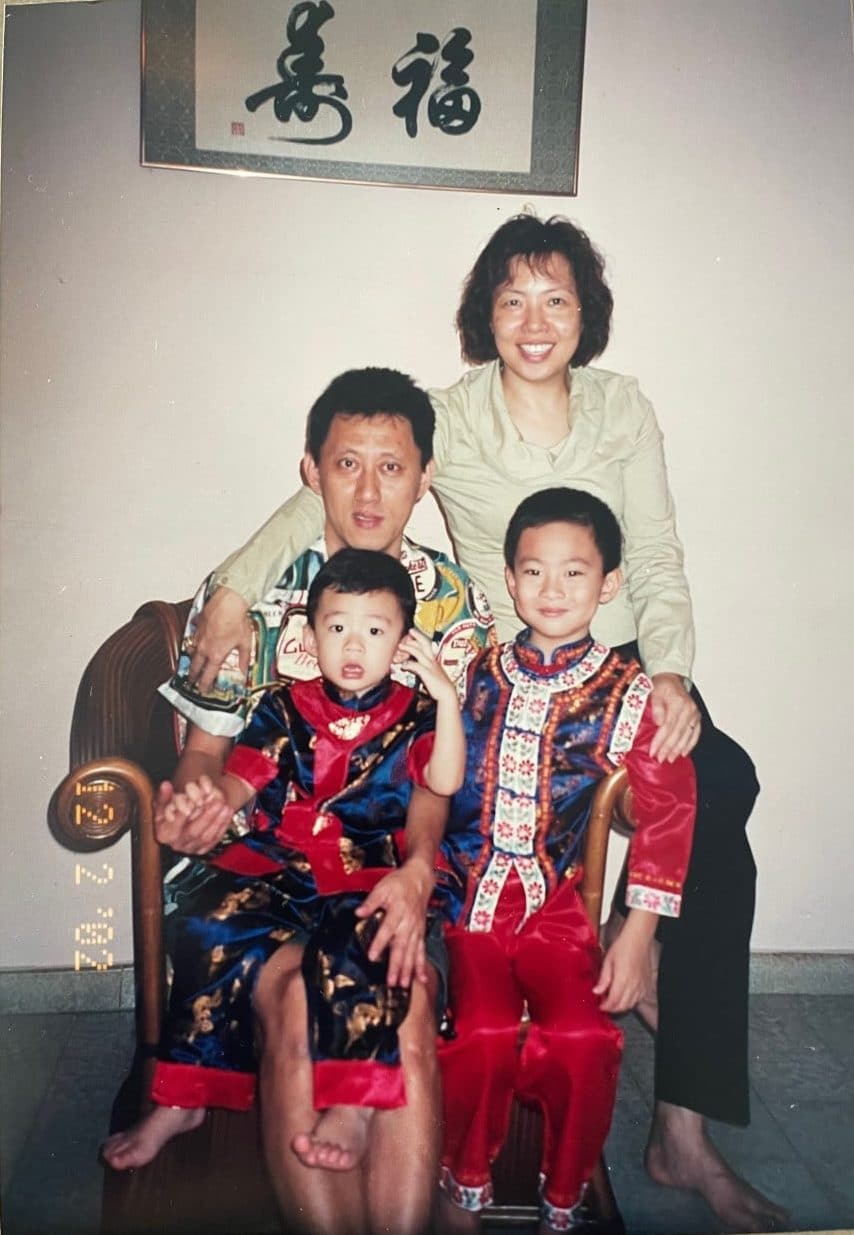
The family celebrating Chinese New Year in 2002.
When she decided to quit her job at a multinational IT company after working there for 20 years, Margaret prayed for guidance even though she was still not a Christian. After a few months, she felt she received the green light to leave her job.
She took on various part-time positions – a consultancy role, leadership workshop trainings as well as starting her own venture capital firm.
“Perhaps, I should start looking after my own life?” she thought.
Then a friend Margaret trusted invited her to church. She went.
Soon, she signed up for a Bible study class to find out more about the God to whom she turned in her times of need.
She also attended Ellel Ministries Singapore to find healing of her inner hurts.

As part of self-care, Margaret has been going on morning walks with her friends a few times a week.
Nine months later, in September 2013, Margaret was baptised at Church of Our Saviour. Margaret was 50 years old.
But the years to come would challenge Margaret’s love for her husband and her faith.
By 2017, almost a decade after her husband’s diagnosis, his delusions had progressed so far that he thought they were no longer married to each other.
“I came back one evening and he had called the boys into the room and wouldn’t allow me to join the discussion. And he asked the boys for permission to remarry.”

Margaret and her husband in 2017 at a farm in Ratchaburi, Thailand. The last time he told her he loved her was in 2018 – nine years after he was diagnosed with schizophrenia.
Then, he began ignoring her.
“I fell out of love when all I saw were the ugly symptoms. When you face it every day, how can you love this person?” Margaret admitted.
“The hardest thing is toggling between being a wife and a caregiver. I had to learn to separate the illness from the person.
That was when Margaret really sought to love her husband with the immense love that her God has for her.
She found herself becoming more compassionate towards her husband.
“The love of Christ actually helped me fall in love with my husband all over again,” she said.
“During the phases of recovery when he was more normal, I could focus on enjoying him, doing things together and creating joyful and loving memories with him.”
Those memories would sustain Margaret when her husband stopped responding to the medication.
Needing a more regimented environment than what he had at home, her husband was eventually sent to the Institute of Mental Health (IMH) for long-term stay in June 2020.

Margaret and husband celebrating their engagement and ROM in 1990.
It was a decision Margaret and her elder son – who also became a Christian – prayed over.
Her husband’s mental illness has progressed to a stage where “70% of the time, he is engaging in hallucinations and delusion”.
“His mind may have rejected me but his body still has memories of me. His love for me is still intact.”
Yet through it all, Margaret has seen God’s grace.
Even though her husband continues to call her his ex-wife, Margaret is the only one he would allow to cut his hair and shave his face.
“His psychologist said that his mind may have rejected me but his body still has memories of me. His love for me is still intact,” she said.
When he is more himself, he welcomes her visits with a smile. He asks for updates about the world outside and allows her to play him songs from Journey and the Eagles – his favourite bands.

Margaret’s husband teaching their younger son how to swim in 2000.
When their sons visit, he gives them fatherly advice about housing and driving.
“I felt so touched. He still thinks about the family. He still cares.”
Two years on, Margaret is “at peace”.

In the last few years, Margaret has taken to cycling around Singapore in the evenings a few times a week with her friends.
While she still misses her husband, especially when Covid safety measures prohibited visits, she no longer cries about it as much.
In the earlier days, she would pray for her husband’s healing.
Now, she leans on God.
“I have learnt to surrender to God when all forms of treatment fail and allow Him to have His way with me and my husband.
“All I need to do is to make sure I am calm, seek Him first instead of looking for a solution on my own.”
Margaret chronicled her journey as a caregiver to her husband in her book, One Husband, Two Men (2017, reprinted in 2021).
This is an excerpt of an article that first appeared in Salt&Light.
Click here to join our Telegram family for more stories like Margaret’s.
He’s a single dad who raised 4 kids on his own – but almost gave up










